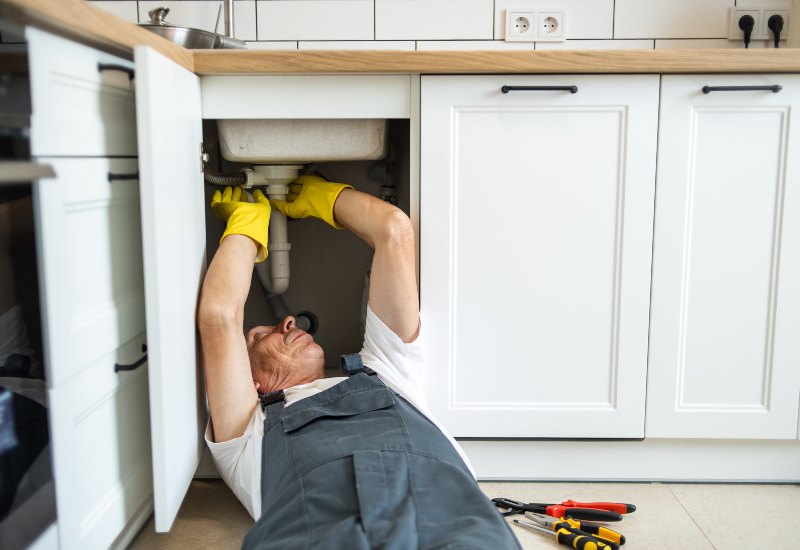
Picture this: it’s the middle of the night, your home is peaceful and quiet, and everyone is sound asleep. Yet behind the scenes, a burst pipe is causing hidden damage to your floors, walls, and ceilings. What do you do? With the right approach, you can navigate this plumbing emergency before your Seattle home turns into an indoor swimming pool.
What Causes a Pipe to Burst?
Burst pipes often result from underlying issues, including:
- Cold temperatures: Pipes bursting due to cold weather is a concern even in temperate Seattle. When the thermometer dips below freezing, standing water inside pipes can freeze. As water turns to ice, it expands, putting pressure on the pipe’s interior. This pressure can cause the pipe to crack or burst catastrophically.
- Rust: Over time, imbalanced pH levels and high iron content in your water can lead to corrosion. The damage occurs slowly, with pipes gradually weakening until they can no longer withstand the internal water pressure. Homes with well water are particularly susceptible to rust because the water typically has more iron, accelerating the corrosion process.
- Pipe movement: Settling soil, heavy construction vibrations, or seasonal expansion and contraction due to temperature changes can cause unexpected shifts. These movements place undue stress on your pipes, particularly at the joints. The shifting may not cause an immediate problem but can lead to weak spots that fracture or burst under pressure later on.
- Clogs: Blockages from accumulated hair, grease, or other waste lead to pressure buildup in the pipes. If a clog goes unchecked, the continuous pressure can cause the pipe to expand and eventually burst. This is especially likely for deep clogs within the system, where the pressure can’t be relieved by normal means and may go unnoticed until it’s too late.
Signs of a Burst Pipe
It’s easy to spot a burst pipe if you know what to look for. Being alert to these warning signs can mean the difference between a quick fix and extensive water damage:
- Water puddles: The most immediate sign of a burst pipe is standing water. If you notice puddles forming, especially in areas without plumbing fixtures, a pipe has likely burst. Keep an eye out for water in strange places, such as the middle of a room or along a wall.
- Low water pressure: A significant drop in water pressure when you turn on a faucet or showerhead may indicate a burst pipe. This drop in pressure occurs because water is leaking from the system through a damaged pipe, reducing the amount that reaches the fixture.
- Wall stains: Discolored patches or wet spots on walls or ceilings signal a leak. The location of the stain can clue you in as to the source of the leak.
- Discolored water: If your tap water suddenly turns reddish-brown, this may mean a pipe has corroded. The discoloration is typically due to rust and may warn you that a compromised pipe is about to fail or already has.
- Unexpectedly high water bill: An unnoticed burst pipe can lead to significant water waste, which you might first detect as a spike in your water bill. If your consumption habits haven’t changed, but your bill has increased, a burst pipe might be the culprit.
- Strange smells or sounds: A burst pipe may release a distinct metallic smell due to rust and metal particles in the water. Sounds of dripping, banging, or hissing inside the walls or under the floors also clearly indicate that water is escaping from the pipes.
What to Do if a Pipe Bursts
If a pipe in your house bursts, time and water are against you. Here’s what you should do:
- Turn off the main water supply: This stops more water from entering your pipes and making the situation worse. It’s a crucial first step to take.
- Call an emergency plumber: As soon as you’ve shut off the water, contact a plumber. It’s important to get professional help on the way as quickly as possible to limit the damage.
- Clean up the water: While you wait for the plumber to arrive, clean up as much water as possible using towels, mops, or a wet/dry vacuum. The faster you get the water cleaned up, the less damage it will do.
- Drain your faucets: With the main water supply off, open all your faucets to drain the remaining water from the plumbing system. This helps relieve built-up pressure and prevents more water from leaking through ruptured pipes.
- Gently warm frozen areas: If the burst is due to freezing temperatures, gradually heat the affected pipe with a hair dryer or similar heating device to thaw the ice.
- Keep windows and doors open: Weather permitting, let air circulate around your home to dry out damp areas. This is especially important in rooms with exposed pipes.
- Document the damage: Take pictures of the burst pipe and the areas affected by water damage. You’ll need these when you file an insurance claim.
- Contact a water damage specialist: If the water damage is significant, a specialist can assess the full extent of it and begin property restoration.
Contact an Emergency Plumber in Seattle
When a burst pipe turns your night upside down, you need a trustworthy company to set things right. That’s where Puget Sound Plumbing and Heating comes in. We’ve served the Seattle area for over 20 years as a family business committed to affordable, reliable plumbing services. Our 24/7 emergency plumbing repairs have you covered day and night. Plus, our team of fully licensed pros won’t call the job complete until you’re happy with the work. So the next time a pipe bursts in the middle of the night, call us at (206) 938-3219, and we’ll get your home back to normal as quickly as possible.


